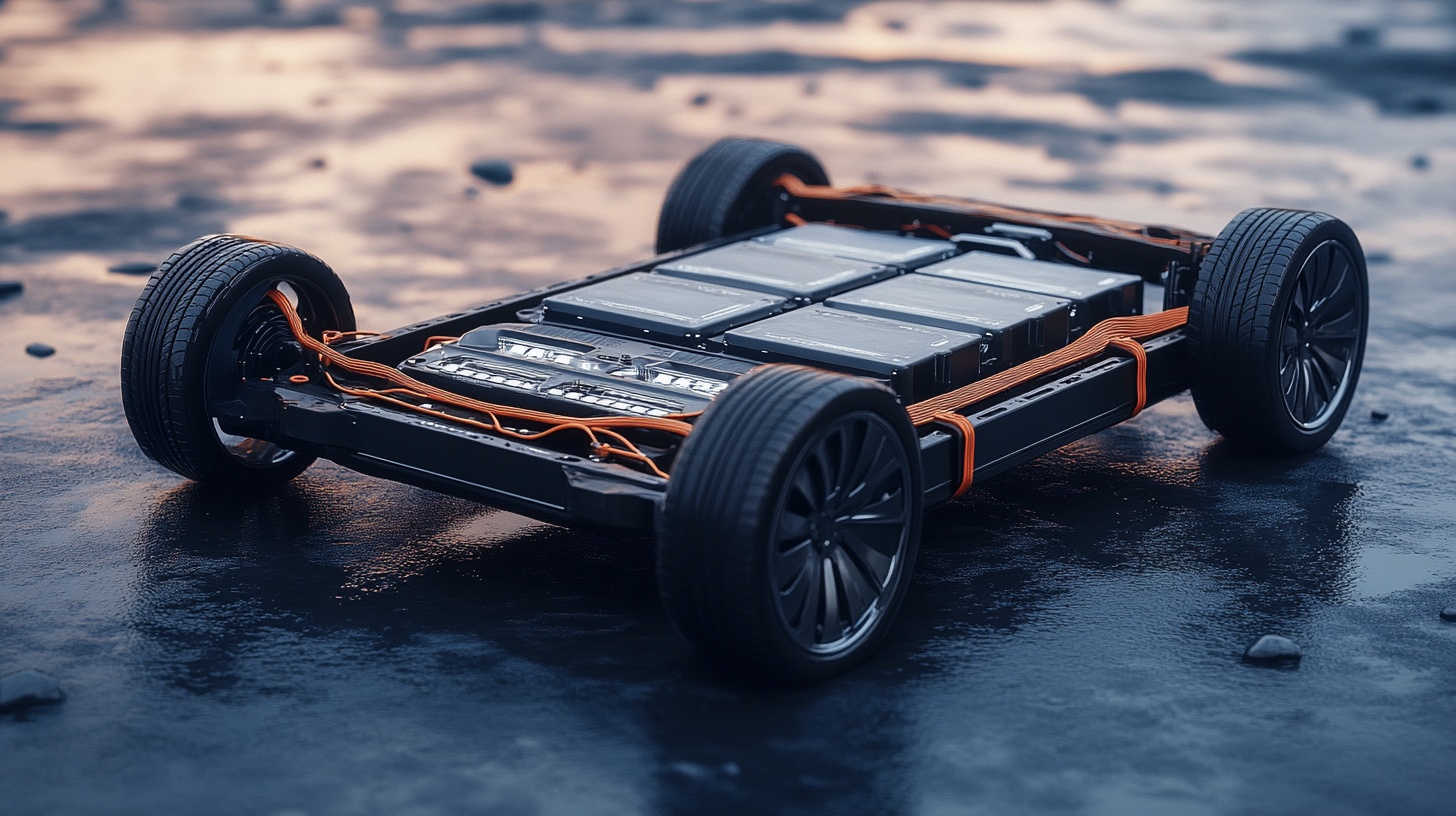Unveiling the Future of Automotive Batteries for Smart Driving Solutions
As the automotive industry pivots towards sustainability and advanced technologies, the focus on Automotive Batteries has never been more critical. According to a recent report by the International Energy Agency (IEA), electric vehicle (EV) sales surged by 108% globally in 2021, underscoring a significant shift among consumers towards smarter driving solutions that are not only eco-friendly but also technologically advanced. This essence of innovation is mirrored in the evolving landscape of automotive batteries; by 2030, it is projected that the demand for electric vehicle batteries will surpass 2,000 GWh, emphasizing the urgent need for efficient, durable, and reliable battery solutions.
Moreover, the global battery market is anticipated to witness substantial growth, with BloombergNEF forecasting that the global battery market will reach $6 trillion by 2030. As automobile manufacturers increasingly integrate smart driving technologies such as autonomous features and connected vehicle systems, the role of high-performance Automotive Batteries becomes even more paramount. These enhancements require batteries that can deliver not only power but also safety, longevity, and rapid charging capabilities. In this blog, we will explore the latest advancements in automotive battery technology, the challenges ahead, and the promising innovations that are set to revolutionize the automotive landscape.

Revolutionizing Energy Storage: The Next Generation of Automotive Batteries
The evolution of automotive technology has ushered in a new era of energy storage solutions, revolutionizing the landscape of electric vehicles (EVs). The next generation of automotive batteries is designed to address both performance and sustainability, ensuring that smart driving solutions meet the demands of modern consumers. With innovations such as solid-state batteries and advanced lithium-sulfur compositions, we are on the brink of significant advancements that promise longer ranges, faster charging, and enhanced safety features. One of the key developments in energy storage is the shift towards solid-state batteries. Unlike traditional lithium-ion batteries, solid-state variants employ a solid electrolyte, which not only mitigates the risks of leakage and combustion but also allows for a higher energy density. This means that vehicles can achieve longer distances on a single charge, elevating the practicality of EVs for everyday use. Moreover, these batteries have a shorter charging time, making them more convenient for users who rely on quick top-ups during busy schedules. Another promising direction is the exploration of alternative materials, such as lithium-sulfur batteries, which offer the potential for significantly increased energy capacity. This could pave the way for lightweight vehicles that do not compromise on power or performance, allowing for smarter driving solutions that enhance mobility and accessibility. As we continue to innovate, the future of automotive batteries looks bright, promising a smarter, greener, and more efficient driving experience for all.

The Role of Smart Technology in Enhancing Battery Performance
As the automotive industry evolves towards smart driving solutions, battery technologies play a pivotal role in enhancing both performance and efficiency. The recent advancements showcased at the 2024 World Power Battery Conference highlight the potential of the second-generation LFP (Lithium Iron Phosphate) batteries developed by Weir, marking a significant step into a new era for battery technology. These batteries not only ensure safety and longevity but also integrate smart technologies designed to optimize energy use, a necessity for supporting the growing demands of electric vehicles.
Smart technology is revolutionizing battery management systems, enhancing performance metrics such as charge time and cycle life. Industry reports indicate that AI-driven algorithms can improve battery efficiency by up to 25%, ensuring that electric vehicles can meet the high range expectations of modern users. Additionally, the emergence of silicon-carbon anodes is set to increase battery capacities, with projections that upcoming smartphone batteries could reach 6000mAh, signifying a trend that will likely transfer to automotive applications. Companies are also gearing up to address the impending demand for batteries in humanoid robots, as the push for smart automation intensifies, further illuminating the critical intersection of smart technology and battery development.
The convergence of AI technologies with battery performance is becoming increasingly essential. According to recent studies, battery longevity and efficiency directly correlate with AI-optimized materials and structural designs. As companies like幻量科技 (Phantom Technology) lead initiatives in artificial intelligence for material research, the synergy between smart technology and battery innovation promises to propel the automotive sector into an era of unprecedented operational excellence. The emergence of these technologies underscores the significance of smart enhancements in reimagining battery solutions for the electric vehicles of tomorrow.

Sustainable Materials: Driving Eco-Friendly Innovations in Battery Production
The automotive industry is undergoing a significant transformation, with the shift towards electric vehicles (EVs) highlighting the critical role of battery technology. A key aspect of this evolution is the increasing focus on sustainable materials in battery production, which is crucial for reducing the environmental impact of these innovations. According to a recent report from the International Energy Agency (IEA), it is projected that by 2030, the EV market will require approximately 2.5 million tons of lithium and over 1 million tons of cobalt. This surge in demand emphasizes the necessity for environmentally conscious sourcing and processing techniques.
Moreover, advancements in battery chemistry are enabling manufacturers to utilize alternative materials such as recycled lithium and bio-based components. Research by the Massachusetts Institute of Technology (MIT) indicates that using recycled materials can cut the carbon footprint of battery production by up to 70%. This not only conserves natural resources but also mitigates the detrimental effects associated with mining operations and harmful emissions. As the automotive sector pushes towards a circular economy, initiatives to reclaim and reuse battery materials will be pivotal in fostering sustainable growth.
The trend towards eco-friendly innovations is also reflected in the development of solid-state batteries, which promise higher energy densities and enhanced safety. Companies like QuantumScape are pioneering these technologies, and studies suggest that they can utilize less toxic materials in their construction. According to a 2023 report from BloombergNEF, the adoption of solid-state batteries could lead to a 50% reduction in reliance on traditional, environmentally damaging materials by 2035. This evolution of battery technology not only ensures better performance but also aligns with the global shift toward sustainability, making eco-friendly innovations a cornerstone of future smart driving solutions.

Challenges Ahead: Overcoming Obstacles in Battery Technology Development
As the automotive industry pivots towards more sustainable solutions, battery technology has become a critical focal point for smart driving solutions. However, several challenges impede the rapid advancement of automotive batteries. Industry reports indicate that the global electric vehicle (EV) market is expected to grow from approximately 6.5 million units in 2021 to nearly 27 million by 2030, a compound annual growth rate (CAGR) of over 17% (ResearchAndMarkets, 2022). This surging demand significantly heightens the pressure on battery technology to evolve.
One of the primary challenges facing battery technology is energy density. Current lithium-ion batteries deliver an energy density of about 250 Wh/kg, but for electric vehicles to achieve longer ranges—ideally over 500 miles on a single charge—research indicates that energy densities need to exceed 400 Wh/kg (IDTechEx, 2023). Achieving this goal necessitates breakthroughs in materials science, including solid-state batteries and alternative chemistries like lithium-sulfur. These advancements not only promise better performance but also pose manufacturing scalability issues.
Additionally, supply chain constraints for critical raw materials like lithium, cobalt, and nickel are another obstacle to consider. According to the International Energy Agency, the usage of lithium in batteries could increase by up to 70 times by 2030 to meet the climate goals set in the Paris Agreement. Such a drastic rise in demand raises questions about sourcing and sustainability, making the industry rethink not just how batteries are made but also what they are made from. Addressing these issues will be pivotal in realizing the full potential of smart driving solutions while remaining environmentally responsible.
The Impact of Advanced Batteries on the Future of Autonomous Vehicles
As we delve into the evolving landscape of autonomous vehicles, one cannot overlook the crucial role that advanced batteries play in this transformation. The future of smart driving solutions is fundamentally intertwined with breakthroughs in battery technology, directly impacting the performance, safety, and efficiency of self-driving cars. These vehicles require not only substantial energy storage but also rapid charging capabilities to ensure seamless operation in real-world conditions.
Advanced battery technologies, such as solid-state batteries and next-generation lithium-sulfur cells, promise to offer higher energy densities compared to traditional lithium-ion batteries. This enhancement is vital for autonomous vehicles, which need to support extensive onboard systems including cameras, sensors, and artificial intelligence algorithms while maintaining long ranges on a single charge. The weight and space saved by these innovative battery solutions mean that manufacturers can prioritize additional features and increases in vehicle performance without compromising battery life.
Moreover, the development of smarter battery management systems will play a significant role in integrating these power sources with the vehicles' autonomous functions. Real-time monitoring and adaptive charging strategies can help optimize battery usage, prolong lifespan, and enhance overall vehicle reliability. As the industry pushes towards entirely autonomously operating cars, the interplay between advanced batteries and AI technologies will be key to realizing the potential of smart driving solutions, ensuring that they are not only innovative but also sustainable and efficient.

